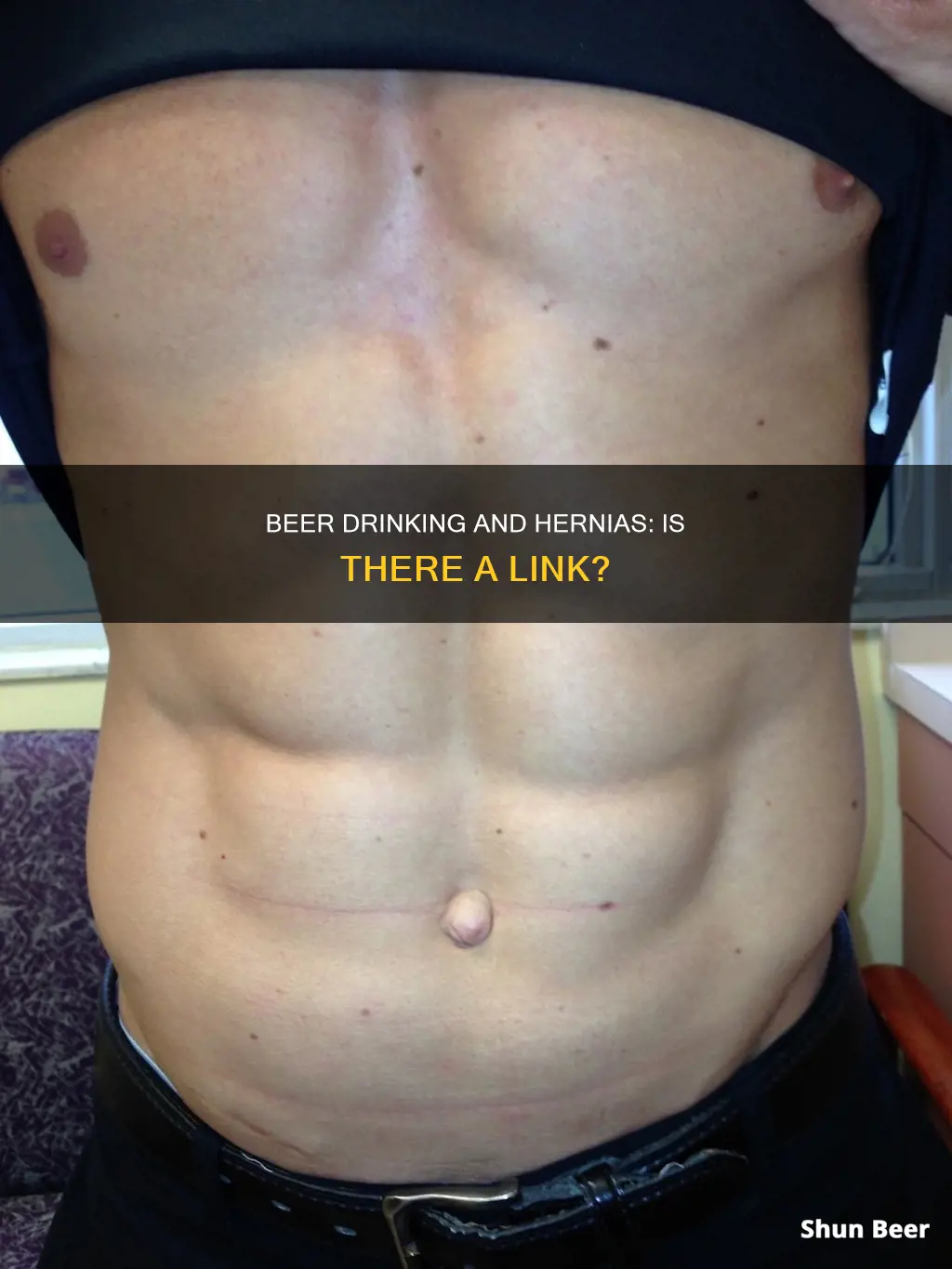
Drinking beer and other forms of alcohol consumption are not directly linked to causing hernias. However, excessive drinking can irritate a hernia and make hernia-related problems more likely. For example, alcohol can aggravate heartburn, a common issue for those with a hiatal hernia. Additionally, alcohol can relax the valve between the stomach and oesophagus, exacerbating acid reflux. Furthermore, alcohol is known to have corrosive effects on the oesophagus, increasing the risk of severe heartburn and chest pain. It is recommended that those with a hernia only drink in moderation to keep symptoms under control.
| Characteristics | Values |
|---|---|
| Can drinking beer cause a hernia? | There is no clear evidence that drinking beer can cause a hernia. However, heavy drinking can worsen hernia-related problems and increase the risk of developing one. |
| Drinking beer after hernia repair | It is not recommended to drink beer or any other alcoholic beverage after hernia repair surgery as it can interfere with healing and cause other complications. |
| Alcohol and hernia | Alcohol can irritate the hernia and trigger symptoms such as heartburn, acid reflux, and chest pain. It can also lead to weight gain, which can worsen the condition. |
| Hernia prevention | Quitting alcohol, losing weight, and avoiding smoking are recommended to prevent and manage hernias. |
What You'll Learn

Drinking beer after hernia repair
Drinking beer and other alcoholic beverages can irritate a hernia in several ways. Alcoholic drinks, especially red wine and beer, are very acidic and should be avoided if you experience heartburn. Additionally, alcohol is damaging to the tissues of the oesophagus, oesophageal sphincter, and stomach, which can trigger acid reflux and other symptoms. Alcohol also relaxes the lower oesophageal sphincter, allowing stomach contents to reflux into the oesophagus. Furthermore, excessive drinking increases the risk of forceful vomiting, which can worsen a hernia.
While the connection between alcohol and hernias is unclear, heavy drinking is associated with several health conditions. Tobacco, alcohol, and diabetes cause a remodelling of the cremaster muscle, leading to a loss of support or structural change in the region, which may enhance the occurrences and damage related to inguinal hernias.
Therefore, it is generally recommended to refrain from drinking beer and other alcoholic beverages after hernia repair. Losing weight, avoiding smoking, and reducing alcohol consumption can help alleviate hernia symptoms. It is important to consult a doctor for specific advice and guidelines regarding alcohol consumption after hernia repair.
Wet Paper Towel on Beer: Does This Method Work?
You may want to see also

Hernia symptoms and treatment
Hernias are caused by a combination of muscle weakness and strain. They occur when an organ or tissue pushes through an opening or weak spot in the muscle or tissue that holds it in place. Hernias typically occur in the abdomen, between the chest and hips, but can also appear in the upper thigh and groin areas.
Hernia Symptoms
The most common symptom of a hernia is a bulge or lump in the affected area. This lump may "disappear" when you're lying down and be more noticeable when you're standing up, bending down, or coughing. Discomfort or pain in the area around the lump may also be present.
Other symptoms depend on the type of hernia:
- Inguinal hernias, the most common type, can cause pain or discomfort in the groin area, especially when bending over, coughing, or lifting something heavy.
- Hiatal hernias often cause gastroesophageal reflux disease (GERD), resulting in symptoms such as heartburn, trouble swallowing, and chest pain.
- Umbilical hernias are common in babies and children and appear as a bulge near the belly button, especially when crying.
- Incisional hernias occur at the site of a surgical incision, often after abdominal surgery.
Hernia Treatment
The only way to effectively treat a hernia is through surgical repair. Hernia repair surgery involves pushing the bulging tissue back into the abdomen and sewing the area shut, sometimes using surgical mesh for reinforcement. The surgery can be performed as open surgery or laparoscopic surgery, depending on the type and severity of the hernia.
If you suspect you have a hernia, it is important to see a doctor. While many hernias are not immediately life-threatening, they don't go away on their own and can cause dangerous complications if left untreated. Your doctor may recommend watchful waiting or surgery, depending on the severity of your hernia.
Craft Beer Enthusiasts: Meet the Founders of Ratio Beer Works
You may want to see also

Hernia prevention
Although it is unclear whether drinking beer can increase the risk of developing a hernia, heavy drinking is associated with several health conditions. Alcohol can trigger heartburn, especially in people with hiatal hernia, and can also have a corrosive effect on the oesophagus.
- Use proper lifting techniques: Use your legs to lift, not your back or waist. If the load is too heavy, get help or use equipment.
- Maintain a healthy body weight: Excessive body weight puts pressure on the abdominal wall, causing it to weaken over time.
- Increase core strength: Strengthening the muscles in your abdomen and groin will help them stay strong and elastic. Exercises such as planks, sit-ups, and pelvic tilts can help improve core strength.
- Exercise to strengthen weak areas: Daily exercise can help to strengthen areas where hernias pose a risk. Light weights, yoga, walking, and swimming are some examples of non-impact aerobic activities that can help prevent hernias.
- Avoid straining during bowel movements: Constipation increases pressure in the intestines, which may lead to a hernia. Drinking plenty of water and eating a high-fibre diet can help prevent constipation and ease bowel movements.
- Avoid heavy coughing: Heavy coughing puts stress on your abdomen, which may cause a hernia. Quitting smoking can help reduce the risk of chronic coughing.
- Improve your posture: Poor posture can put extra strain on your muscles and increase the risk of developing a hernia.
- Listen to your body when exercising: Excessive muscle strain or injury can cause hernias, so be careful not to overdo it when lifting weights or exercising.
- Wear supportive clothing: If your job or hobby involves a lot of standing or heavy lifting, consider wearing a hernia belt or compression shorts to support your muscles.
Lactic Acidosis in Beer: Lab Work Indicators
You may want to see also

Hernia and alcohol
Hernias are caused by straining, which can occur for many different reasons. While it is not clear whether alcohol increases the risk of developing a hernia, heavy drinking can make hernia-related problems more likely. For example, alcohol can aggravate heartburn, a common problem in people with hiatal hernia.
Alcohol has a corrosive effect on the oesophagus and can triple the risk of severe heartburn and chest pain. It can also relax the valve between the stomach and oesophagus, making acid reflux worse. Additionally, ethanol in alcohol is converted into substances that can signal the body not to burn sugar or fat, affecting weight management. Obesity may worsen the disease as it can cause a loss of support or structural change in the region of the hernia.
Nicotine weakens the abdominal wall, and it has been found that smokers are four times more likely to experience a recurrent hernia. Similarly, drinkers are also more likely to develop a hernia in the first place, as alcohol negatively affects the gastrointestinal tract, stomach, and immune system.
Therefore, it is recommended to drink only in moderation. If you have a hiatal hernia, you may need to significantly reduce your alcohol consumption.
Drinking Alcohol-Free Beer: Is It Safe to Drive in the UK?
You may want to see also

Hernia and gastrointestinal issues
Hernias are caused by straining, which can occur for many different reasons. Drinking beer can cause bloating, which may irritate a hernia. However, it is unclear whether drinking beer can increase the risk of developing a hernia.
Alcohol can have a corrosive effect on the oesophagus and amplify the symptoms of reflux, increasing the risk of severe heartburn and chest pain. It can also relax the valve between the stomach and oesophagus, making gastroesophageal reflux disease (GERD) worse. GERD is quite common in people with hiatal hernias, as the hiatus does not effectively prevent acid from backing up into the oesophagus. Therefore, alcohol can aggravate heartburn in people with hiatal hernias.
Additionally, alcohol is converted into substances that can signal the body not to burn sugar or fat, affecting weight management. Maintaining a healthy weight is important for people with hernias, as obesity may worsen the condition.
To stay on the safe side, it is recommended to drink in moderation. If you have a hiatal hernia, you may need to significantly reduce your alcohol intake.
Should Children Drink Light Beer at Home?
You may want to see also
Frequently asked questions
There is no clear evidence that drinking beer or any other form of alcohol directly causes hernias. However, heavy drinking can worsen hernia-related problems and increase the likelihood of developing a hernia.
Alcohol can irritate the stomach and aggravate heartburn, which is a common problem for people with hiatal hernias. It can also relax the valve between the stomach and esophagus, making gastroesophageal reflux disease (GERD) worse.
It is generally recommended to refrain from drinking alcohol after hernia surgery, especially while still taking narcotic pain medication. It is best to consult with your doctor about when and how much alcohol you can consume post-surgery.
Alcohol, especially in excessive amounts, is not recommended for people with hernias. Nicotine and caffeine should also be avoided as they can irritate the abdominal wall and trigger heartburn.
Quitting or reducing alcohol consumption, along with losing weight, avoiding smoking, and maintaining a healthy body weight, can help manage hernia symptoms and reduce the likelihood of developing or worsening a hernia.







